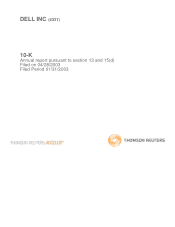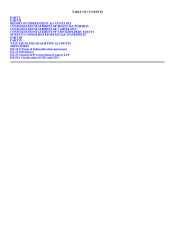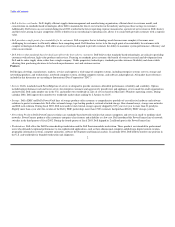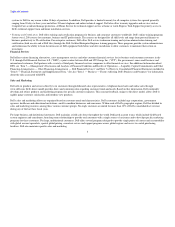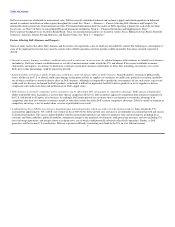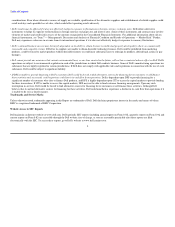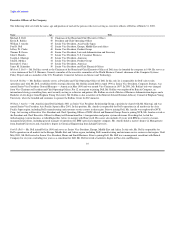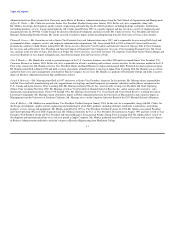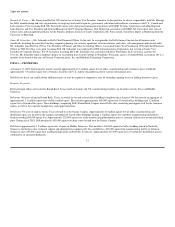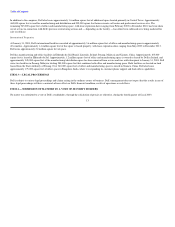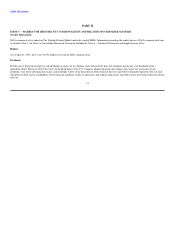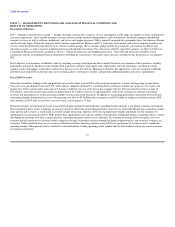Dell 2002 Annual Report Download - page 9
Download and view the complete annual report
Please find page 9 of the 2002 Dell annual report below. You can navigate through the pages in the report by either clicking on the pages listed below, or by using the keyword search tool below to find specific information within the annual report.
Table of Contents
Dell has obtained U.S. federal trademark registration for its DELL word mark and its Dell logo mark. Dell owns registrations for 43 of its other marks in the
U.S. As of March 31, 2003, Dell had pending applications for registration of 33 other trademarks. Dell believes that establishment of the DELL mark and logo
in the U.S. is material to Dell's operations. Dell has also applied for or obtained registration of the DELL mark and several other marks in approximately 176
other countries.
Dell has entered into a variety of intellectual property licensing and cross-licensing agreements. In addition, Dell has entered into nonexclusive licensing
agreements with Microsoft Corporation for various operating system and application software. Dell has also entered into various software licensing
agreements with other companies.
From time to time, other companies and individuals assert exclusive patent, copyright, trademark or other intellectual property rights to technologies or marks
that are important to the technology industry or Dell's business. Dell evaluates each claim relating to its products and, if appropriate, seeks a license to use the
protected technology. The licensing agreements generally do not require the licensor to assist Dell in duplicating its patented technology nor do these
agreements protect Dell from trade secret, copyright or other violations by Dell or its suppliers in developing or selling these products. See "Item 1 —
Business — Factors Affecting Dell's Business and Prospects" for information about the risks associated intellectual property rights.
Employees
On January 31, 2003, Dell had approximately 39,100 regular employees. Approximately 21,200 of those employees were located in the U.S., and
approximately 17,900 were located in other countries. Dell believes that its ability to attract and retain qualified personnel is critical to its success and
achievement of its business plan. Dell has never experienced a work stoppage due to labor difficulties and believes that its employee relations are good.
Government Regulation
Dell's business is subject to regulation by various federal and state governmental agencies. Such regulation includes the radio frequency emission regulatory
activities of the U.S. Federal Communications Commission, the anti-trust regulatory activities of the U.S. Federal Trade Commission and Department of
Justice, the consumer protection laws of the Federal Trade Commission, the import/export regulatory activities of the U.S. Department of Commerce, the
product safety regulatory activities of the U.S. Consumer Products Safety Commission, and environmental regulation by a variety of regulatory authorities in
each of the areas in which Dell conducts business. Dell is also subject to regulation in other countries where it conducts business. In certain jurisdictions, such
regulatory requirements may be more stringent than in the U.S.
Backlog
Dell believes that backlog is not a meaningful indicator of net revenue that can be expected for any period. There can be no assurance that the backlog at any
point in time will translate into net revenue in any subsequent period, as unfilled orders can generally be canceled at any time by the customer. At the end of
fiscal 2003, 2002, and 2001, backlog was not material.
Geographic Areas of Operations
Dell conducts operations worldwide and is managed generally on a geographic basis. The three geographic regions are the Americas, Europe and Asia
Pacific-Japan regions. The Americas region is based in Round Rock, Texas, and covers the U.S., Canada, South America and Latin America. The Americas
region is further segmented into Business and U.S. Consumer. The Europe region, which is based in Bracknell, England, covers the European countries and
also some countries in the Middle East and Africa. The Asia Pacific-Japan region covers the Pacific Rim, including Japan, India, China, Australia and New
Zealand, and is based in Singapore. In fiscal 2003, approximately 34% of
6

